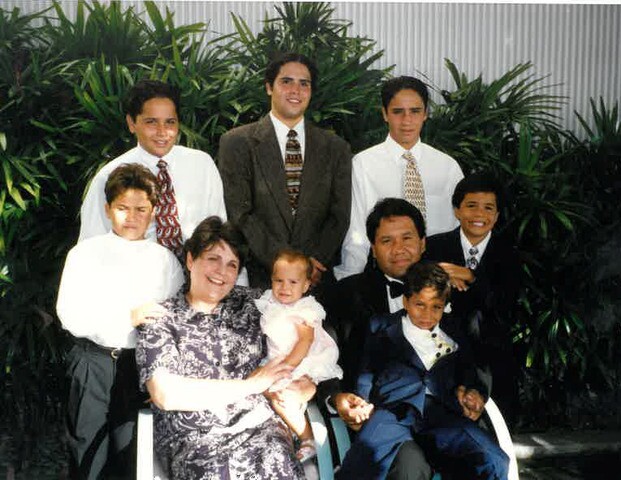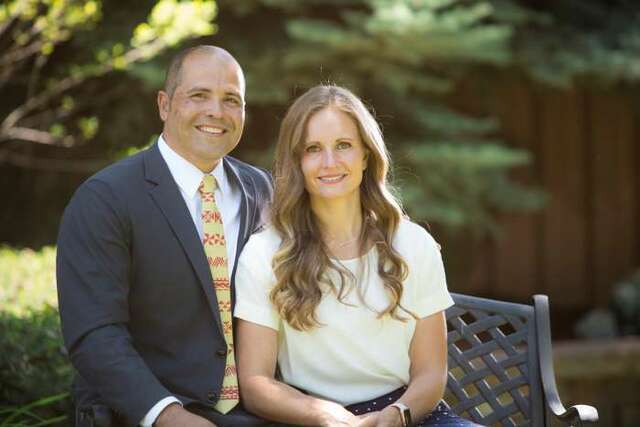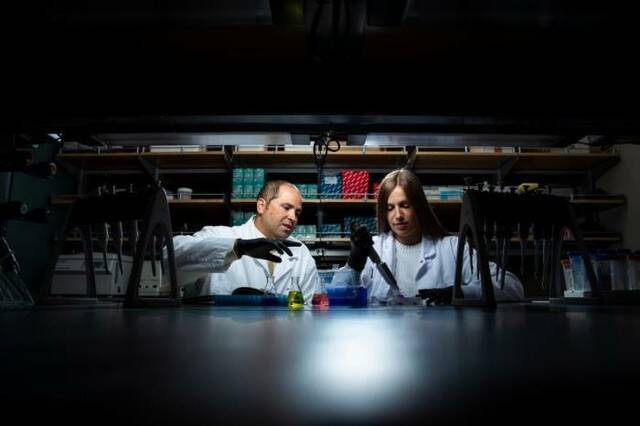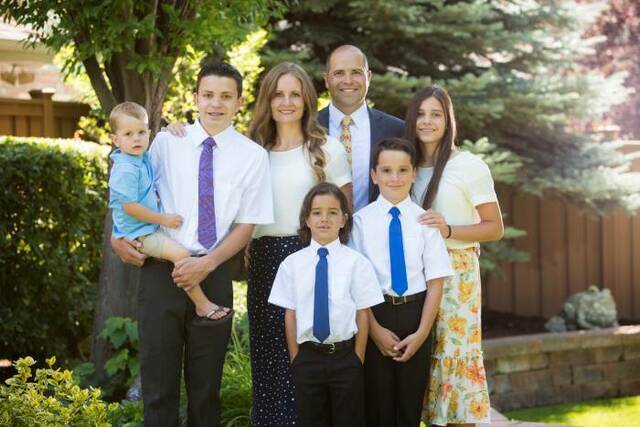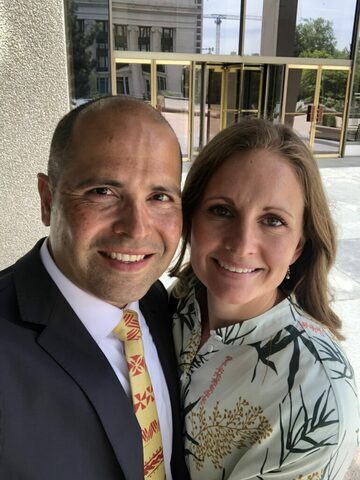This article appears in the September/October 2020 issue of LDS Living magazine.
It isn’t every day that Brigham Young University–Hawaii gets a new president. And while the change is happening during a time of irregularity, a more perfect person couldn’t have been picked to fill the role. Meet Keoni Kauwe: husband and father, direct descendant of one of Hawaii’s most well-known Latter-day Saint converts, Alzheimer’s researcher, and the new president of BYU–Hawaii.
Two weeks had passed since Dr. John “Keoni” Kauwe had heard anything from Church headquarters. Days earlier, despite feeling inadequate for such a call and after meeting with Elder Jeffrey R. Holland twice, Dr. Kauwe and his wife, Monica, wondered if Dr. Kauwe was being considered for a leadership position at BYU–Hawaii.
If you look at Dr. Kauwe’s background and professional experience, there are plenty of reasons a call to serve in Hawaii makes perfect sense. For starters, while Dr. Kauwe was born in Utah, one of his fourth great-grandfathers, Kaleohano, was one of the first converts to The Church of Jesus Christ of Latter-day Saints in Hawaii and was taught by Elder George Q. Cannon in 1851. A graduate of Molokai High School in 1996, Dr. Kauwe moved back and forth between the Hawaiian Islands and Utah during his growing up years and has a mixed-race heritage that includes Pacific Island and Asian ancestry—two of the student populations BYU–Hawaii seeks to serve.
And then there are the collaborative relationships he developed during his time as a professor and dean at BYU as he worked with conservation organizations and schools in Hawaii— including students and faculty at BYU–Hawaii—in addition to his work researching Alzheimer’s disease. He and his wife considered these things as they met with Elder Holland.
But a couple of weeks passed without any follow-up meetings, and Dr. Kauwe began thinking he had been “awfully arrogant” to consider the possibility of a leadership position in the first place. As a result, he began to create another mental list—only, this time it was a list of reasons why he would not be qualified for the position. Among them, the fact that he was 40 years old and very young for the job in addition to still having young children at home.
“Maybe we wouldn’t be that great at it because we’re not perfect or because I’m not anywhere near as eloquent as John Tanner,” Dr. Kauwe remembers comparing himself to the school’s outgoing president. “We had all of these things where we thought, ‘Wow, why would we even think that the Church would want us to do that?’”
Not long after, the Kauwes received an email saying the First Presidency would like to meet with them.
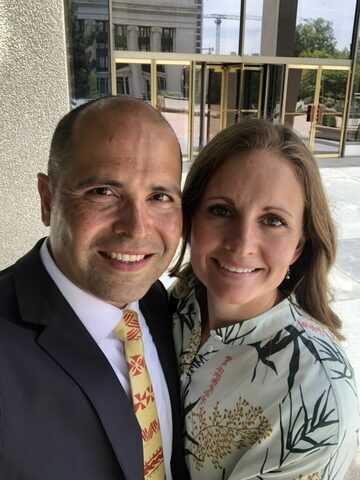
Keoni Kauwe and his wife, Monica, in front of the Church Office Building just after accepting his call.
Dr. Kauwe remembers walking with his wife into a room with the First Presidency, Elder Holland, and commissioner of the Church Educational System Elder Paul V. Johnson and feeling the excitement and confidence of these men—confidence that the Kauwes were equal to the calling extended to them to serve as president of BYU–Hawaii.
“We felt confirmation from the Spirit in our meeting with them—first that they are prophets, seers, and revelators called of God to lead. And secondly, that we could do this. We had the confidence of them and the Lord that, despite our weaknesses and imperfections and the things we worry about, we could do this,” President Kauwe said.
It is then perhaps no coincidence or surprise to hear that President Kauwe’s greatest hope for the students he is going to be responsible for at BYU–Hawaii is that they will feel the same confidence that he was given that day in the First Presidency’s office.
“I want them to know that I believe in them, that their families believe in them, that their Church leaders believe in them, that the Lord believes in them. I believe in their capacity to have faith, to be exceptional in their scholarly endeavors, and to influence the world for good,” he says.
Acknowledging the unintentional parallel between how he felt after meeting with General Authorities and how he wants BYU–Hawaii students to feel, he drives the point home:
“That’s what we all need, and the Lord has that in us, but we sometimes forget about that and His confidence in us and we get worried about other things. So it’s really nice to have someone remind us that ‘Yeah, we know you’re just the Kauwes, and we know you’re not perfect, and the Lord knows that too, but you also have great potential and great things that you can offer, and we’re confident that you’re going to do it.’
“That feeling is great, and I want my students to have that same feeling.”
Family Legacy
On May 12, 2020, Elder Jeffrey R. Holland introduced Dr. Kauwe as the next BYU–Hawaii president and said, “‘God moves in . . . mysterious ways, His wonders to perform.’ To help perform some of them, He has brought a native son back to the very origins of the restored Church in the Pacific.”
In order to understand the significance of that moment and Elder Holland’s comments, it is necessary to go back in time to explore the Church’s rich history in the Hawaiian Islands along with the Kauwe family’s tie to that history.
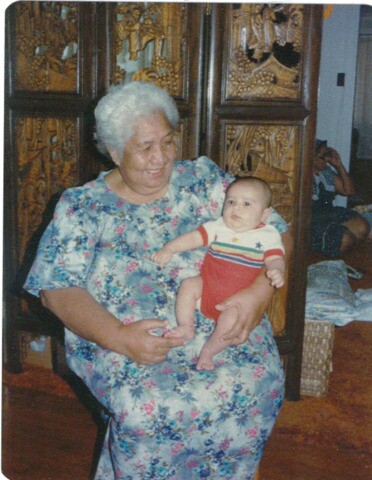
Keoni Kauwe is held by his great-grandmother Hattie Haliaka Kaehuanaole Kalili
In 1851, long before there was a temple or a university in Laie, George Q. Cannon was a new missionary serving on the island of Maui when he met and baptized a man named Kaleohano. After being baptized, Kaleohano went on to devote his life to the gospel, serving countless missions, and is remembered as someone who “gave his all for the kingdom of God,” according to Elder Holland. Kaleohano’s family legacy has meant a great deal over the course of President Kauwe’s life.
“This is not manufactured,” President Kauwe says, “[Kaleohano’s] spiritual legacy has been a part of my life from my earliest memories. My 2-year-old can sing the song Kaleohano wrote about his baptism. . . . It’s an important part of our lives and our testimony.”
A Prophecy Fulfilled in Laie
In 1921, 47-year-old Elder David O. McKay, then of the Quorum of the Twelve Apostles, visited Laie, a town on Oahu that sits on 6,000 acres of land owned by The Church of Jesus Christ of Latter-day Saints. Elder McKay was on a year-long worldwide tour of Church missions, and it was during this visit that he watched 127 children participate in a flag-raising ceremony at a local elementary school. The children were of many different nationalities, and the experience moved Elder McKay to tears. He wrote that he was moved by the children’s participation “as though they all belonged to one nation, one country, one tongue.”
This experience planted a seed of desire in the future prophet’s heart to establish a Church school or college in Laie. Later, on February 12, 1955, while presiding as the prophet at the school’s groundbreaking in Laie, President McKay prophesied, “From this school, I’ll tell you, will go men and women whose influence will be felt for good towards the establishment of peace internationally.”
The prophet also made a prophesy about the city of Laie that must have seemed nearly impossible:
We dedicate our actions in this service unto thee and unto thy glory and to the salvation of the children of men, that this college, and the temple, and the town of Laie may become a missionary factor, influencing not thousands, not tens of thousands, but millions of people who will come seeking to know what this town and its significance are.
In the year 1955, when President McKay made this statement, only 109,798 tourists came to the Hawaiian Islands, most of whom visited the Waikiki area and did not venture to the distant town of Laie. But in 1962, in hopes of providing employment opportunities for the college students in Laie, President McKay authorized construction of the Polynesian Cultural Center (PCC), and in October 1963, the center opened its doors for the first time. In its first 50 years (1963–2013), the PCC attracted more than 39 million visitors to Laie, and as of 2017, over 20,000 BYU–Hawaii students had been employed by the tourist attraction since its opening.
Today at BYU–Hawaii, over 70 countries are represented by the school’s 3,000 students, and next year will mark 100 years since the flag-raising President McKay witnessed—a moment that changed the Hawaiian Islands forever.
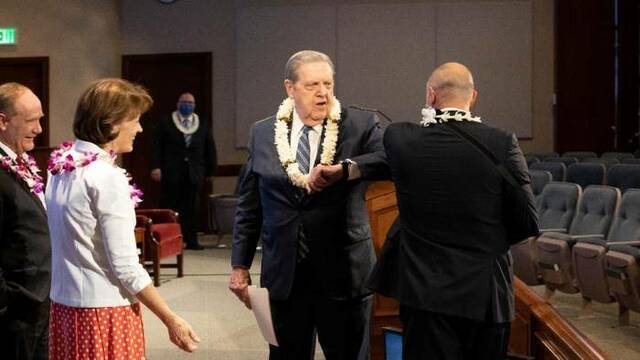
Photo of Elder Holland and President Kauwe fromChurch Newsroom
It is difficult to ignore the singular significance of President Kauwe’s call and its part in the continued fulfilling of President McKay's vision. Elder Holland also highlighted the fulfillment of prophecy during his introduction of the new president, saying, "May I just say on a personal note that surely somewhere on the other side of the veil today President David O. McKay is reminiscing . . . saying, 'I told you there were young men and women in those islands who would rise to the top of their professions if we gave them the chance for an education. I was right, and there stands Keoni Kauwe to prove it.'"
A Man of Science and Faith
While President Kauwe will soon be known by thousands for his leadership at BYU–Hawaii, he was known for his love of science first. To those outside of the science community, it is possible that they are most familiar with research conducted by President Kauwe, which includes exploring the genetics behind how fellow Latter-day Saint NBA player Shawn Bradley grew to a towering 7 feet 6 inches.
The research, which was prompted by President Kauwe being seated next to Bradley on an airplane, was covered by the Wall Street Journal as well as other well-known publications. Just the fact that this study attracted so much attention makes President Kauwe laugh because the reality is that he is a world-renowned expert on Alzheimer’s disease. He has published more than 100 peer-reviewed articles on the subject, and his research is funded by more than six million dollars in extramural grants. His ultimate goal? Finding a cure for Alzheimer’s, which is the sixth-leading cause of death in the United States.
President Kauwe’s interest in and determination to find a cure for the ravaging disease is not the result of a specific life-changing experience, although his great-grandmother did have Alzheimer’s. Instead, it was first fueled by his desire to be mentored by Alison Goate, director of the Center on Alzheimer’s Disease at the Icahn School of Medicine at Mount Sinai.
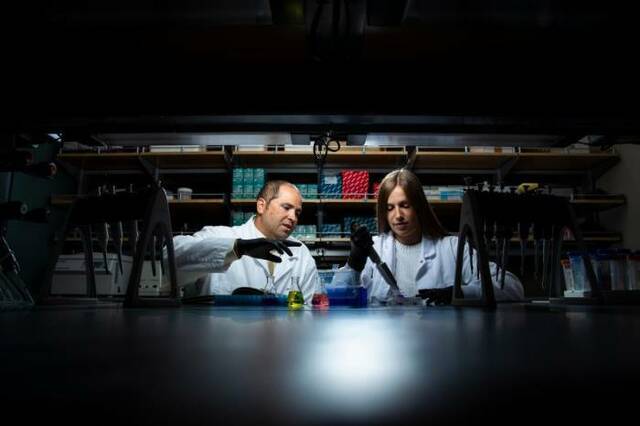
Image fromBYU–Hawaii
"It became clear to me that I needed to be trained by the kind of person and the kind of scientist that she was,” he explains about his decision to begin studying Alzheimer’s, which he will continue to do while serving as president of BYU–Hawaii.
But then as he worked to understand the disease, “Very rapidly the real impact of this disease became clear to me,” he says.
“I realized that we have this devastating disease that destroys not just the person’s memories but impacts every aspect of their family, financially, emotionally, physically. . . . If your loved one has Alzheimer’s disease, your own life expectancy declines. Everything about the disease is devastating, so as I learned that and felt that, I became committed to being part of the solution.”
While certainly a man of science, President Kauwe says his research has only solidified his belief in a living God. In a 2016 BYU forum address, President Kauwe recalled being asked by a scientific board member if he believed in religion. When he replied in the affirmative, the board member replied, “But you seem so smart. How do you believe that stuff?” President Kauwe says the long answer of how he believes “that stuff” would fill a fireside talk. But in short, he says his testimony is strengthened by his knowledge of a God who commanded us to teach and learn together of all things in and on and beneath the earth—a God who promises that the knowledge we gain will be to our advantage in the world to come.
“For me, as I seek knowledge and learning in both secular and spiritual realms, I feel a confirmation of the Spirit telling me that all of those things testify of Him,” he says. “And that knowledge is going to help me provide solutions to the problems that come up in my life and in the lives of those for whom I’m responsible both secularly and spiritually.”
That responsibility is not something President Kauwe takes lightly. As he has worked at BYU as a professor and researcher in the biology department over the last 11 years, becoming dean of graduate studies last May, President Kauwe recognizes the unique challenges that college students face today.
“I think the pressures of today, society and the way we define success, the complexities we have in our lives, and the layers of complexity that are created by technology and economics and expectations—today’s college-age adults face an intensity of pressure and a division of attention that is really unprecedented,” he says. “So, the challenges of anxiety, depression, perfectionism— those are really significant in that age group.”
He considers it a great honor to work with these students and to have an influence at such an impressionable point in their lives.
“To be able to be involved in their lives at a time when they are building the foundation of their faith and the foundation of their professional endeavors is a real privilege,” he says of his time at BYU. “It’s this great opportunity to help them figure out what they want from their life and to give them the resources and the experiences to accomplish that and be successful. And it’s not in any sense that you can take credit for what they do, but you can watch them and be grateful that you’re able to help build the foundation that they’re launching from.”
President and Sister Kauwe look forward to being with students on campus, and Sister Susan Tanner says she hopes that when the time does come to return to Laie, students will do so with “grateful appreciation and love for being able to be there and partake of the Spirit that is there.”
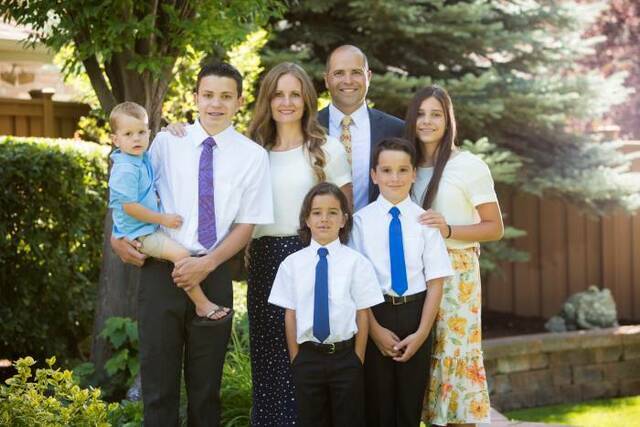
Photo by Jed Wells
Monica Kauwe says it is her husband’s concern for others and his desire for their success that has influenced many students’ lives. It is this same quality that she believes will make him an influential university president. “He works hard to help them in any way he can,” she says. President Kauwe knows he will not do this alone. He and his wife are a team, and they will work together to influence the students of BYU–Hawaii while raising their five children, ages 2 to 13.
Susan Tanner, former Young Women General President and wife of outgoing BYU–Hawaii President John Tanner, says that Monica Kauwe’s “willing heart and willing spirit” will also serve as a great benefit to the school. “She’ll do well because of her willingness and her goodness to do what the Lord expects of her,” Sister Tanner says.
And so, the Kauwes will bring their young family to the island of Oahu—a place where Susan Tanner says the soft breezes and warmth of the ocean and the air are indicative of the people who live there: “Loving and warm and beautiful.” It is a place Keoni Kauwe has loved his whole life, and one where he will now have the chance to instill that same love in the next generation.
“Hawaiians are proud of the heritage we have with the Church—the heritage of service and devotion and testimony— and I think you can feel that in Laie,” he says.
Bonus:
A Precise Mission
In an interview right after the announcement that he would be BYU–Hawaii’s next president, President Kauwe used an unusual adjective to describe the BYU–Hawaii mission statement and vision: precise.
“I don’t know how many institutions have the same precision in terms of both secular and spiritual education and geographic focus. That’s something I’m trying to really understand,” he told the Daily Herald.
When asked what he means by this, it is difficult to miss the thought that has gone into his answer. He explains that the focus on spiritual and secular learning immediately places the school in a very small percentage of universities, which he considers “very exciting for people like us who care [about] the spiritual component and for whom our testimony of Jesus Christ is an important part of our lives and the way we live our lives.”
But he continues to highlight specific phrases in the school’s mission and vision.
Of the phrase “Educating the minds and spirits of students with an intercultural gospel-centered environment and curriculum,” he says, “So now [we’re] saying we’re going to be different from most places because [the school is] spiritual and secular, and on top of that, this intercultural component is very, very important.”
And in relation to “Preparing men and women with intercultural leadership skills for international brotherhood, to promote world peace, to address world problems,” he shares, “So this is a university where the intent is to understand and work across cultures and across geographic boundaries and foster peace. That’s a lot more detail than what most universities say their mission is. And then on top of that, you say, ‘Oh, and we’re really focused on Asia and the Pacific.’”
John Tanner, President Kauwe’s predecessor, says this mission is what makes the school so special, and understanding the significance of that mission will make President Kauwe, in Tanner’s words, a “wonderful president.”
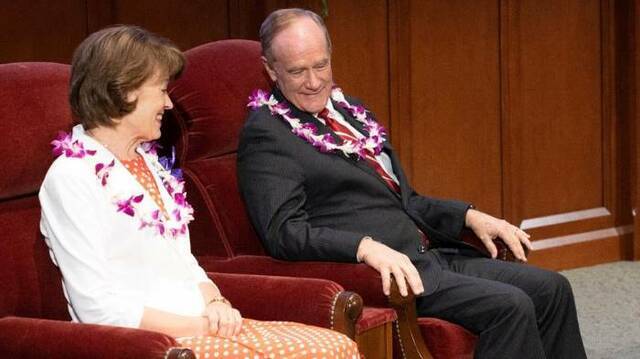
Photo of outgoing President John S. Tanner and his wife, Susan, from Church Newsroom
I feel so pleased and grateful that he has the vision that he has for the university,” President Tanner says. “It’s grounded on the prophetic vision . . . and I feel really good about the hand off because he’s just going to run with it. He’ll be much better than I am in so many ways, but it will be the continuation of the kinds of things we’ve envisioned over the years.”
BYU–Hawaii and COVID-19
On June 10, 2020, BYU–Hawaii announced that all classes during the fall 2020 semester would be taught remotely. The school’s outgoing president, John S. Tanner, explained that the school has tried to follow the lead of the Church as well as the local government in making their decision. With a granddaughter who was set to attend BYU–Hawaii in the fall, the Tanners said this decision has been hard personally, but as they seek to serve students from over 70 different countries, a decision had to be made quicker than they would’ve liked. Students traveling to the university needed to make travel plans, and the school needed to make a plan for remote learning in different time zones, not to mention trying to figure out the logistical problems caused by countries whose borders are currently closed. The Tanners have been impressed with President Kauwe’s commitment to “safety first” as the decision was discussed, and President Kauwe believes it was the right choice.
“It was not a lightly made decision. It doesn’t save us money, and it’s not easier,” President Kauwe explains, adding that the current plan is actually more expensive. “It’s not ideal for learning, it’s not ideal for teaching, but nothing is ideal in a global pandemic.”
Lead image by Jed Wells. Photo of Keoni Kauwe with his wife in front of the Church office building and with his great-grandmother both courtesy of Keoni Kauwe.


